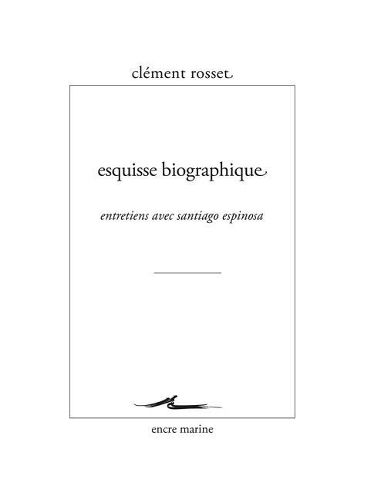Readings Newsletter
Become a Readings Member to make your shopping experience even easier.
Sign in or sign up for free!
You’re not far away from qualifying for FREE standard shipping within Australia
You’ve qualified for FREE standard shipping within Australia
The cart is loading…






In this book, Clement Rosset talks openly with Santiago Espinosa on various subjects. In a first part, consisting of five discussions, Rosset relates, with humour, the three events in his life which had the greatest impact on him and led him to pursue philosophical inquiry. This involved talking about his childhood, his love of music and literature, his years as a student at Ecole normale superieure, and later at Universite de Nice. He recalls his favourite authors, his relations with the Academie and with philosophers who were his contemporaries, and whom, on occasion, he befriended (Cioran, Deleuze, Jankelevitch, Descombes). In a second part, in view of a number of misinterpretations made by commentators about the author, two discussions strive to clarify and expand upon the concept at the heart of his philosophy: the double and the real. This, then, is both a biographical book in which Rosset talks about himself, and a basic work in which readers will discover either a conceptual supplement to books they have already read, or an introduction and invitation to read them.
$9.00 standard shipping within Australia
FREE standard shipping within Australia for orders over $100.00
Express & International shipping calculated at checkout
In this book, Clement Rosset talks openly with Santiago Espinosa on various subjects. In a first part, consisting of five discussions, Rosset relates, with humour, the three events in his life which had the greatest impact on him and led him to pursue philosophical inquiry. This involved talking about his childhood, his love of music and literature, his years as a student at Ecole normale superieure, and later at Universite de Nice. He recalls his favourite authors, his relations with the Academie and with philosophers who were his contemporaries, and whom, on occasion, he befriended (Cioran, Deleuze, Jankelevitch, Descombes). In a second part, in view of a number of misinterpretations made by commentators about the author, two discussions strive to clarify and expand upon the concept at the heart of his philosophy: the double and the real. This, then, is both a biographical book in which Rosset talks about himself, and a basic work in which readers will discover either a conceptual supplement to books they have already read, or an introduction and invitation to read them.